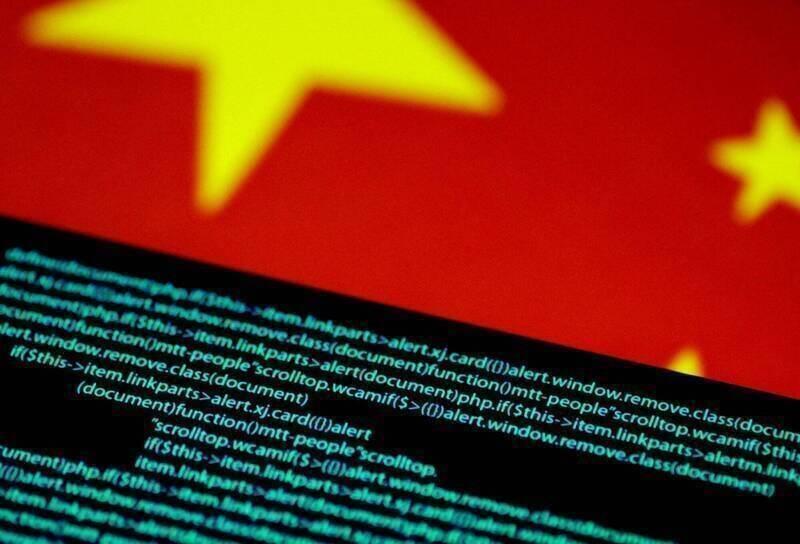Chinese-linked hackers are targeting the Taiwanese semiconductor industry and investment analysts as part of a string of cyber-espionage campaigns, researchers said yesterday.
While hacking to steal data and information about the industry is not new, there is an increase in sustained hacking campaigns from several China-aligned hacking groups, researchers with cybersecurity firm Proofpoint said in a new analysis.
“We’ve seen entities that we hadn’t ever seen being targeted in the past being targeted,” said Mark Kelly, a threat researcher focused on Chinese-related threats at Proofpoint.

Photo: Reuters
The previously unreported hacking campaigns were carried out by at least three distinct Chinese-linked groups primarily between March and last month, with some activity likely ongoing, Proofpoint said. They come amid rising restrictions by Washington on exports to China of US-designed chips that are often manufactured in Taiwan. China's chip industry has been working to replace its dwindling supply of sophisticated US chips, especially those used in artificial intelligence.
The researchers declined to identify the hacking targets, but told Reuters that approximately 15 to 20 organizations ranging from small businesses, analysts employed by at least one US-headquartered international bank, and large global enterprises faced attacks.
Major Taiwanese semiconductor firms include Taiwan Semiconductor Manufacturing Co, MediaTek, United Microelectronics Corp, Nanya Technology and RealTek Semiconductor. TSMC declined to comment. MediaTek, UMC, Nanya and RealTek did not respond to requests for comment.
Reuters was unable to identify the specific hacking targets or determine whether any of the efforts were successful.
A spokesperson for the Chinese embassy in Washington told Reuters in an email that cyberattacks “are a common threat faced by all countries, China included,” and that the Asian country “firmly opposes and combats all forms of cyber attacks and cyber crime — a position that is consistent and clear.”
The activity ranged from one or two emails sent as part of the more targeted campaign focused on specific people, to as many as 80 emails when trying to gain information from the company at large, Kelly said.
One group targeted semiconductor design, manufacturing and supply-chain organizations using compromised Taiwanese university email accounts to pose as job seekers and send malware via PDFs with URLs leading to malicious files, or a password-protected archive.
Another targeted financial analysts at major unnamed investment firms focused on the Taiwanese semiconductor industry by posing as a fictitious investment firm and seeking collaboration. Two of the entities are based in Asia, while the third is based in the US. The FBI declined to comment.
A representative of TeamT5, a cybersecurity firm based in Taiwan, told Reuters that it had also seen an increase in emails being sent targeting the semiconductor industry tied to a few hacking groups, “but not a wide or general phenomenon.”
Targeting of semiconductors and the supply chain around them “is a persistent threat that has existed for long,” the representative said, and a “constant interest” for Chinese-related advanced hacking operators.
These groups often target “peripheral suppliers or related industries,” the representative said, such as a situation last month where a China-linked hacking group identified by TeamT5 as "Amoeba" launched a phishing campaign against an unnamed chemical company that plays a critical role in the semiconductor supply chain.

The manufacture of the remaining 28 M1A2T Abrams tanks Taiwan purchased from the US has recently been completed, and they are expected to be delivered within the next one to two months, a source said yesterday. The Ministry of National Defense is arranging cargo ships to transport the tanks to Taiwan as soon as possible, said the source, who is familiar with the matter. The estimated arrival time ranges from late this month to early next month, the source said. The 28 Abrams tanks make up the third and final batch of a total of 108 tanks, valued at about NT$40.5 billion

A group from the Taiwanese Designers in Australia association yesterday represented Taiwan at the Midsumma Pride March in Melbourne. The march, held in the St. Kilda suburb, is the city’s largest LGBTQIA+ parade and the flagship event of the annual Midsumma Festival. It attracted more than 45,000 spectators who supported the 400 groups and 10,000 marchers that participated this year, the association said. Taiwanese Designers said they organized a team to march for Taiwan this year, joining politicians, government agencies, professionals and community organizations in showing support for LGBTQIA+ people and diverse communities. As the first country in Asia to legalize same-sex

Travel agencies in Taiwan are working to secure alternative flights for travelers bound for New Zealand for the Lunar New Year holiday, as Air New Zealand workers are set to strike next week. The airline said that it has confirmed that the planned industrial action by its international wide-body cabin crew would go ahead on Thursday and Friday next week. While the Auckland-based carrier pledged to take reasonable measures to mitigate the impact of the workers’ strike, an Air New Zealand flight arriving at Taipei from Auckland on Thursday and another flight departing from Taipei for Auckland on Saturday would have to

MOTIVES QUESTIONED The PLA considers Xi’s policies toward Taiwan to be driven by personal considerations rather than military assessment, the Epoch Times reports Chinese President Xi Jinping’s (習近平) latest purge of the Chinese People’s Liberation Army (PLA) leadership might have been prompted by the military’s opposition to plans of invading Taiwan, the Epoch Times said. The Chinese military opposes waging war against Taiwan by a large consensus, putting it at odds with Xi’s vision, the Falun Gong-affiliated daily said in a report on Thursday, citing anonymous sources with insight into the PLA’s inner workings. The opposition is not the opinion of a few generals, but a widely shared view among the PLA cadre, the Epoch Times cited them as saying. “Chinese forces know full well that